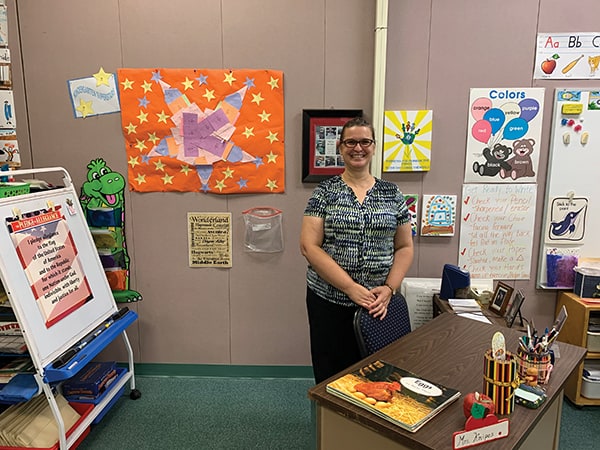By Ethan Weinstein
KILLINGTON—After 28 years teaching at Killington Elementary, one wouldn’t blame Melissa Knipes for burnout. She teaches kindergarteners — 5-year-olds — an age when some still ask for help in the bathroom while others have graduated to chapter books. But Knipes knows no cynicism, no complacency. She radiates warmth. Even entering a third pandemic school year, excitement bursts from all corners of her classroom. She has learned to deal with the new normal, and relishes the opportunity to teach differently.
“You can teach an old dog new trick,” she said. “I am, you know, an older teacher.”
But the way Knipes approaches teaching, you wouldn’t know — that’s the thing.
“It’s definitely my passion,” Knipes said of teaching, especially teaching kindergarten. “I thoroughly enjoy this age level. There is so much that happens throughout the school year in regards to their learning: learning how to read, learning how to write, learning how to count. You’re the foundation for the rest of their school years.”
Part of what makes the age special — the constant evolution, the purity of perspective — made the pivot to Covid education easier. Students wore masks all of last year; the kindergarteners didn’t know school life any other way.
“I started the year off with a superhero theme, because superheroes wear masks. So we talked about superheroes and super powers, and they came up with their own super power themselves. And that just made the mask wearing a lot easier and more comfortable in the classroom,” Knipes said.
So simple, so smart — building relationships with students from Day One while reinforcing the necessary safety measure. Knipes may make adaptation look effortless, but when the pandemic began affecting daily life in the spring of 2020, the changes were disruptive. She and her colleagues had only a day or two to figure out how to switch to remote learning. She had little experience with remote teaching; most parents and students had none.
“I remember sitting most, if not all of the day, working with families, troubleshooting, making sure they were getting an understanding how this worked, because there really wasn’t a formal training for them. So, we just went ahead and started,” Knipes said. “It took a lot of patience and understanding.”
Especially in those early days of Covid, stress consumed homes. Some parents lost their jobs, others were forced to live double lives, both remote worker and all-day parent. For Knipes, part of teaching’s joys come from working with families. She video conferenced with families late in the evenings — often their only free time — to teach parents about the technical necessities of remote learning and update them on remote education. Knipes’s days grew longer, but she did what was necessary.
All the tech-based training ultimately brought families into the classroom in new ways. A staple of the kindergarten school year is the hatching of chicks. Students learn about life cycles and get to watch as incubated eggs break open to reveal newborn chickens. With both kids and parents acquainted with remote learning tools, Knipes took the chick-hatching project to a new level.

Melissa Knipes stands behind her desk inside Killington Elementary School.
“When they start hatching, what I did this year for the first time is I live streamed it. So we had quite the views on there in regards to parents watching it at work or late at night after the kids go to bed. And [they were] really showing their support through emails on how exciting it was to see this happen,” said Knipes.
As cases dwindled early this summer before Delta’s fourth wave, Knipes knew the numbers meant little for her. She works with kids, all of whom are unvaccinated. Thus, though 100% of KES teachers are vaccinated, Knipes and her peers will wear masks. Health precautions sow benefits beyond hindering Covid: Knipes notices a steep decline in student and teacher sick days last year.
Good teaching, she says, comes down to communication: communication from her higher-ups on both the school and district level, communication with students, and communication with parents about expectations and updates.
Knipes praised Superintendent Sherry Sousa for frequent updates relating to Covid policies. Pandemic-related difficulties became problems to solve as a team. Throughout the last year and a half, leadership in WCUSD has been strong, Knipes said, as has collaboration. Teachers shared what worked best for them, and innovative methods spread from classroom to classroom. Each student’s desk came to hold a day’s worth of learning, replete with math manipulatives and other tools that made education in place possible, thus maintaining 6 feet of distancing. Because opportunities to engage with parents dwindled due to safety measures, Knipes created Fun Fridays, an opportunity for parent volunteers to join the class for outdoor activities like biking and sledding. Nimble thinking outpaced the virus’s efforts to curtail a sense of normalcy. Knipes — and KES — are ready.




